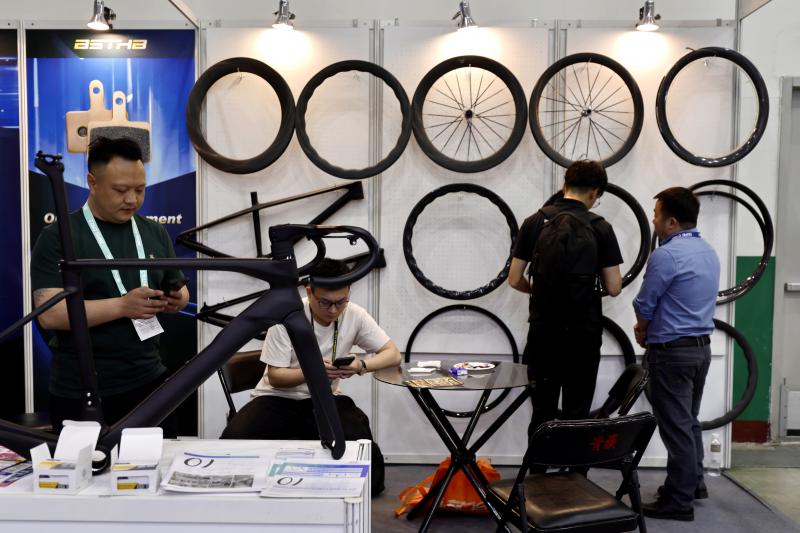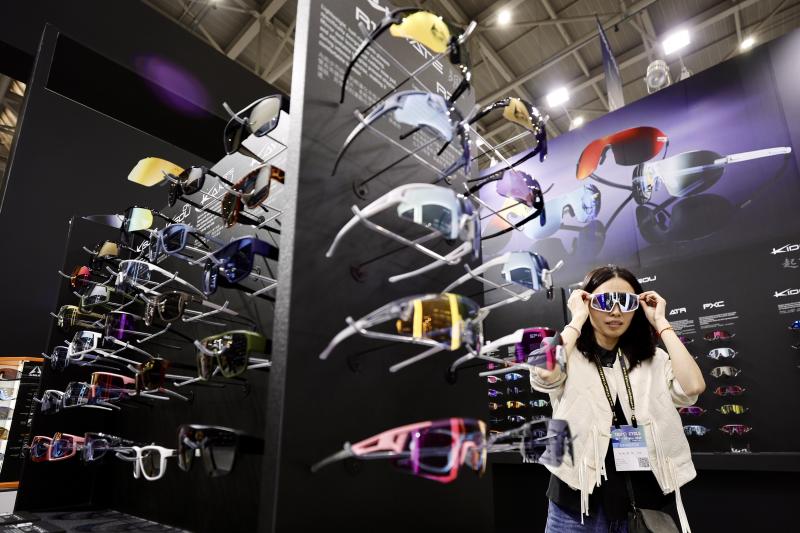The Taipei International Cycle Show (Taipei Cycle) yesterday opened at the Taipei Nangang Exhibition Center, with the event’s organizer expecting a steady recovery in the industry this year following a tough last year.
This year, 980 companies from 35 countries are participating in the annual bicycle trade show, showcasing technological breakthroughs and market development trends of the bicycle industry at 3,600 booths, the Taiwan External Trade Development Council (TAITRA, 外貿協會) said in a statement.
Under the theme “Ride the Revolution,” the exhibition has attracted more than 3,500 international buyers from 80 countries to preregister for the four-day event, which is expected to bring business opportunities to local firms, TAITRA said.

Photo: CNA
TAITRA chairman James Huang (黃志芳) said in his opening speech that Taiwan’s bicycle industry experienced a decline in exports of conventional and electric bicycles last year due to inventory adjustments.
However, the average selling price of exported bicycles has increased more than ever before, indicating that Taiwanese firms are striving to move toward high-end and high-value-added models, he said.
Government data showed exports of conventional bicycles totaled US$1.03 billion last year, down 25.67 percent from US$1.38 billion in 2023, but the average selling price rose 8.33 percent annually to US$1,132.33 per unit.

Photo: Ritchie B. Tongo, EPA-EFE
Exports of electric bicycles fell 44.59 percent to US$672 million last year from US$1.21 billion a year earlier, but the average selling price increased 4.53 percent annually to US$1,847.23 per unit, data showed.
Meanwhile, outbound shipments of bicycle parts last year dropped 17.45 percent to US$1.41 billion, from US$1.71 billion a year earlier, data showed.
Describing Taipei Cycle as the world’s second-largest and Asia’s largest professional bicycle show, Huang said he hoped this year’s event would help the local supply chain secure more international orders than last year.

Photo: Ritchie B. Tongo, EPA-EFE
Taiwan Bicycle Association (台灣自行車公會) chairman Robert Wu (吳盈進) added a sense of optimism, telling a pre-show news conference on Tuesday that the “green shoots” of an industry recovery are in sight.
Market demand gradually improved from the start of this year, Wu said, citing the rising demand for mid-range and low-end models in the US, coupled with strong demand for electric bicycles.
In Europe, consumption momentum remains normal despite the issue of inventory depletion, he said.
As a result, the industry is expected to see gradual recovery each quarter for the remainder of the year, with the more obvious growth likely to emerge in the second half of the year, he added.
As for the impact of US President Donald Trump’s potential tariff policy on the bicycle industry, local firms have had close discussions, and would wait and see how the US policy pans out, Wu said.
There is no urgency for firms to substantially relocate their production bases to other regions for the time being, he said.
The annual bicycle show features a variety of tires, seats, frames, lights, brakes, derailleurs, bicycles and electric bikes. Leading Taiwanese bike brands, such as Giant Manufacturing Co (巨大機械) and Merida Industry Co (美利達), introduced their new products at the show, while other firms, including Acer Gadget Inc (倚天酷碁), Delta Electronics Inc (台達電), Thermaltake Technology Co (曜越科技) and Dyaco International Inc (岱宇國際), exhibited their innovations related to electric and commuter bikes, TAITRA said.
In addition, the event features an innovation area for bike ventures, gathering 11 bicycle start-ups from seven countries to present their new products and services across three aspects: electrification, sustainable solutions and new business models, the organizer said.
TAITRA has also put up an e-cycling pavilion at the show, allowing visitors to enjoy first-hand virtual cycling experience, and has organized a series of forums to explore the economic and cultural impacts of international cycling events, it said.
The Taipei Cycle show, along with the Taipei International Sporting Goods Show, is to run until Saturday in halls 1 and 2 of the Taipei Nangang Exhibition Center.

TAKING STOCK: A Taiwanese cookware firm in Vietnam urged customers to assess inventory or place orders early so shipments can reach the US while tariffs are paused Taiwanese businesses in Vietnam are exploring alternatives after the White House imposed a 46 percent import duty on Vietnamese goods, following US President Donald Trump’s announcement of “reciprocal” tariffs on the US’ trading partners. Lo Shih-liang (羅世良), chairman of Brico Industry Co (裕茂工業), a Taiwanese company that manufactures cast iron cookware and stove components in Vietnam, said that more than 40 percent of his business was tied to the US market, describing the constant US policy shifts as an emotional roller coaster. “I work during the day and stay up all night watching the news. I’ve been following US news until 3am

UNCERTAINTY: Innolux activated a stringent supply chain management mechanism, as it did during the COVID-19 pandemic, to ensure optimal inventory levels for customers Flat-panel display makers AUO Corp (友達) and Innolux Corp (群創) yesterday said that about 12 to 20 percent of their display business is at risk of potential US tariffs and that they would relocate production or shipment destinations to mitigate the levies’ effects. US tariffs would have a direct impact of US$200 million on AUO’s revenue, company chairman Paul Peng (彭雙浪) told reporters on the sidelines of the Touch Taiwan trade show in Taipei yesterday. That would make up about 12 percent of the company’s overall revenue. To cope with the tariff uncertainty, AUO plans to allocate its production to manufacturing facilities in

COLLABORATION: Given Taiwan’s key position in global supply chains, the US firm is discussing strategies with local partners and clients to deal with global uncertainties Advanced Micro Devices Inc (AMD) yesterday said it is meeting with local ecosystem partners, including Taiwan Semiconductor Manufacturing Co (TSMC, 台積電), to discuss strategies, including long-term manufacturing, to navigate uncertainties such as US tariffs, as Taiwan occupies an important position in global supply chains. AMD chief executive officer Lisa Su (蘇姿丰) told reporters that Taiwan is an important part of the chip designer’s ecosystem and she is discussing with partners and customers in Taiwan to forge strong collaborations on different areas during this critical period. AMD has just become the first artificial-intelligence (AI) server chip customer of TSMC to utilize its advanced

Six years ago, LVMH’s billionaire CEO Bernard Arnault and US President Donald Trump cut the blue ribbon on a factory in rural Texas that would make designer handbags for Louis Vuitton, one of the world’s best-known luxury brands. However, since the high-profile opening, the factory has faced a host of problems limiting production, 11 former Louis Vuitton employees said. The site has consistently ranked among the worst-performing for Louis Vuitton globally, “significantly” underperforming other facilities, said three former Louis Vuitton workers and a senior industry source, who cited internal rankings shared with staff. The plant’s problems — which have not